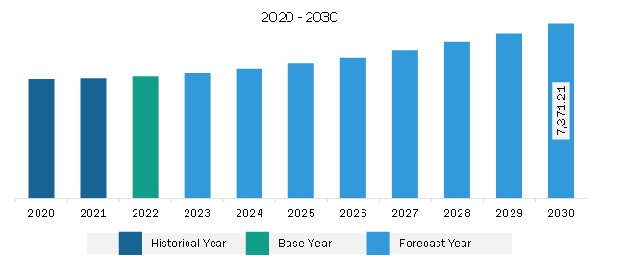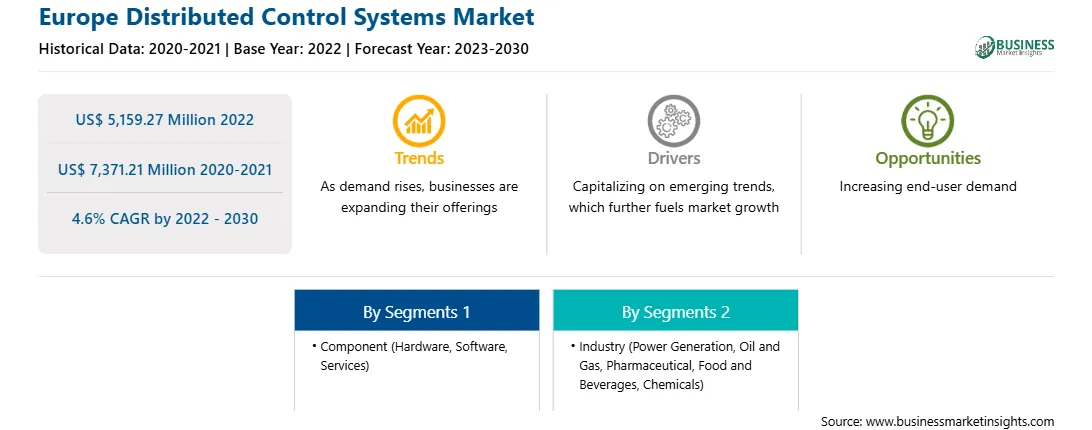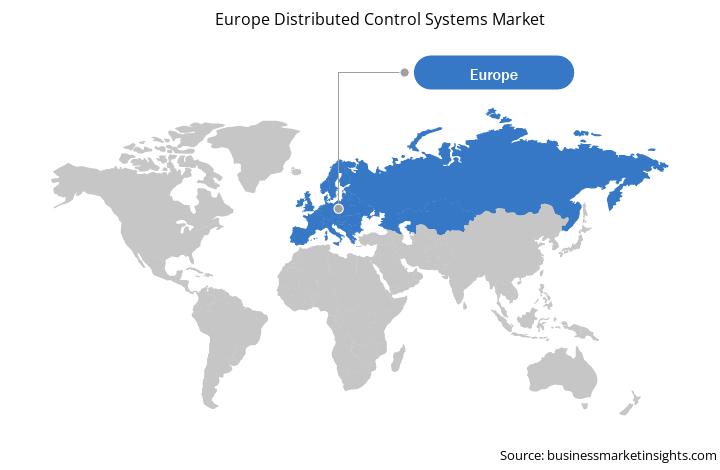The Europe distributed control systems market was valued at US$ 5,159.27 million in 2022 and is expected to reach US$ 7,371.21 million by 2030; it is estimated to register at a CAGR of 4.6% from 2022 to 2030. Integration of New Technologies Fuels Europe Distributed Control Systems Market
By adopting modular and open architectures, DCS can be easily adapted to various applications and scaled up or down depending on specific needs. This flexibility caters to a wider range of customer demands and fosters market growth. Modern architectures promoting seamless integration with different devices and systems (e.g., PLCs, SCADA) create a more collaborative and data-driven control environment. This improved interoperability attracts customers seeking integrated solutions for complex processes, expanding the market potential. Further, integrating edge computing capabilities into DCS architecture allows for localized data processing and decision-making. This reduces network traffic, improves response times, and opens doors for applications such as real-time control and optimization, attracting customers seeking improved efficiency and performance.
The DCS is often a mission-critical system for industrial users. Moreover, it is a heavy investment; hence, replacing them every time a new technology comes along, that could have a profoundly beneficial impact on the user's business, is not practical or affordable. The future DCS will solve this obstacle by being more digital, more flexible. The aim is to enable a more innovative architecture that gives users the capability to improve the DCS without disrupting the process, effectively separating the core functions of the DCS from those that are less time- or process-critical. Thus, architectural development in DCS is expected to provide significant opportunities for the distributed control system market.Europe Distributed Control Systems Market Overview
Europe's distributed control systems market is analyzed on the basis of trends across industries in Germany, France, Italy, the UK, Russia, and the Rest of Europe. Spain, Switzerland, the Netherlands, and Denmark are among the major countries in the Rest of Europe. These countries are technologically advanced, and the governments of the countries mentioned above continuously invest substantial amounts in adopting robust and enhanced technologies. In addition, awareness related to advanced technologies is higher among European individuals and industries; hence, several technology providers find it easy to trade their products, solutions, and services in Europe.
The European Union's (EU) target to drastically reduce greenhouse gas (GHG) emissions and raise the usage of carbon-neutral fuel systems to generate power is progressing steeply. For instance, in February 2024, European Commission announced that they are aiming to cut its net greenhouse gas pollution by 90% by 2040 as part of its mission to become the world's first climate-neutral continent. The continuous emphasis on the remodeling of power generation systems from conventional fuel to renewable sources (especially hydropower) is enabling the power generation industry players to procure technologically advanced systems and solutions to monitor, control/access, and protect equipment, thereby enhancing productivity. This factor is catalyzing the growth of the distributed control systems market in Europe. In addition, several European countries have experienced growth in the number of hydropower generation units in recent years, which is bolstering the growth of the distributed control systems market in Europe.
Europe Distributed Control Systems Market Revenue and Forecast to 2030 (US$ Million)
Strategic insights for the Europe Distributed Control Systems provides data-driven analysis of the industry landscape, including current trends, key players, and regional nuances. These insights offer actionable recommendations, enabling readers to differentiate themselves from competitors by identifying untapped segments or developing unique value propositions. Leveraging data analytics, these insights help industry players anticipate the market shifts, whether investors, manufacturers, or other stakeholders. A future-oriented perspective is essential, helping stakeholders anticipate market shifts and position themselves for long-term success in this dynamic region. Ultimately, effective strategic insights empower readers to make informed decisions that drive profitability and achieve their business objectives within the market. The geographic scope of the Europe Distributed Control Systems refers to the specific areas in which a business operates and competes. Understanding local distinctions, such as diverse consumer preferences (e.g., demand for specific plug types or battery backup durations), varying economic conditions, and regulatory environments, is crucial for tailoring strategies to specific markets. Businesses can expand their reach by identifying underserved areas or adapting their offerings to meet local demands. A clear market focus allows for more effective resource allocation, targeted marketing campaigns, and better positioning against local competitors, ultimately driving growth in those targeted areas.
Europe Distributed Control Systems Strategic Insights

Europe Distributed Control Systems Report Scope
Report Attribute
Details
Market size in 2022
US$ 5,159.27 Million
Market Size by 2030
US$ 7,371.21 Million
CAGR (2022 - 2030) 4.6%
Historical Data
2020-2021
Forecast period
2023-2030
Segments Covered
By Component
By Industry
Regions and Countries Covered
Europe
Market leaders and key company profiles
Europe Distributed Control Systems Regional Insights

Europe Distributed Control Systems Market Segmentation
The Europe distributed control systems market is segmented based on component, industry, and country.
Based on component, the Europe distributed control systems market distributed control systems market is segmented into hardware, software, and services. The hardware segment held the largest share in 2022.
In terms of industry, the Europe distributed control systems market distributed control systems market is segmented into power generation, oil and gas, pharmaceutical, food and beverages, chemicals, and other industries. The oil and gas segment held the largest share in 2022.
Based on country, the Europe distributed control systems market distributed control systems market is categorized into Germany, France, UK, Italy, Spain, and the Rest of Europe. Germany dominated the Europe distributed control systems market in 2022.
Key players operating in the Europe distributed control systems market are Honeywell International Inc, General Electric Co, ABB Ltd, Yokogawa Electric Corp, Toshiba Corp, Siemens AG, Emerson Electric Co, NovaTech LLC, Schneider Electric SE, and Rockwell Automation Inc are some of the leading companies operating in the Europe distributed control systems market.
The Europe Distributed Control Systems Market is valued at US$ 5,159.27 Million in 2022, it is projected to reach US$ 7,371.21 Million by 2030.
As per our report Europe Distributed Control Systems Market, the market size is valued at US$ 5,159.27 Million in 2022, projecting it to reach US$ 7,371.21 Million by 2030. This translates to a CAGR of approximately 4.6% during the forecast period.
The Europe Distributed Control Systems Market report typically cover these key segments-
The historic period, base year, and forecast period can vary slightly depending on the specific market research report. However, for the Europe Distributed Control Systems Market report:
The Europe Distributed Control Systems Market is populated by several key players, each contributing to its growth and innovation. Some of the major players include:
The Europe Distributed Control Systems Market report is valuable for diverse stakeholders, including:
Essentially, anyone involved in or considering involvement in the Europe Distributed Control Systems Market value chain can benefit from the information contained in a comprehensive market report.